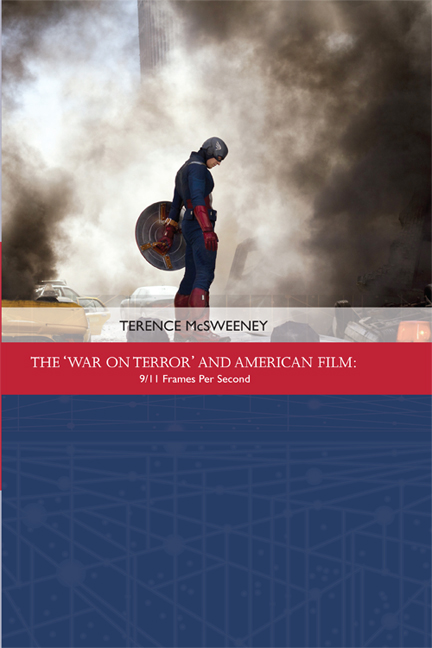Book contents
- Frontmatter
- Contents
- List of Illustrations
- Acknowledgements
- Introduction
- 1 The Lives of Others: Vulnerability in Post-9/ 11 American Cinema
- 2 Boots on the Ground: The New Millennial Combat Film as Cultural Artefact
- 3 ‘Masters of our own Security’: Redemption through Violence in the Post-9/ 11 Action Genre
- 4 Turning to the Dark Side: Challenging American Mythology in the Superhero Genre
- 5 Remaking 9/11: Imagining the Unimaginable in the Alien- invasion Film
- 6 Decade of the Dead: Zombie Films as Allegory of National Trauma
- 7 The Rise and Fall of Empires: The ‘War on Terror’ as Allegorical Moment in Historical Film
- Conclusion
- Bibliography
- Select Filmography
- Index
1 - The Lives of Others: Vulnerability in Post-9/ 11 American Cinema
Published online by Cambridge University Press: 05 August 2016
- Frontmatter
- Contents
- List of Illustrations
- Acknowledgements
- Introduction
- 1 The Lives of Others: Vulnerability in Post-9/ 11 American Cinema
- 2 Boots on the Ground: The New Millennial Combat Film as Cultural Artefact
- 3 ‘Masters of our own Security’: Redemption through Violence in the Post-9/ 11 Action Genre
- 4 Turning to the Dark Side: Challenging American Mythology in the Superhero Genre
- 5 Remaking 9/11: Imagining the Unimaginable in the Alien- invasion Film
- 6 Decade of the Dead: Zombie Films as Allegory of National Trauma
- 7 The Rise and Fall of Empires: The ‘War on Terror’ as Allegorical Moment in Historical Film
- Conclusion
- Bibliography
- Select Filmography
- Index
Summary
Most Americans have probably experienced something like the loss of their First Worldism as a result of the events of September 11 and its aftermath. What kind of loss is this? It is the loss of the prerogative, only and always, to be the one who transgresses the sovereign boundaries of other states, but never to be in the position of having one's own boundaries transgressed. The United States was supposed to be the place that could not be attacked, where life was safe from violence initiated from abroad, where the only violence we knew was the kind we inflicted on ourselves.
Judith Butler, Precarious Life: The Powers of Mourning and ViolenceThe reason for fighting
I never got straight
But I learned to accept it
Accept it with pride
For you don't count the dead
When God's on your side
Bob Dylan, ‘With God on our side’ (1963)It is only to be expected that the art a nation produces primarily engages with the issues that preoccupy that nation. Furthermore, in all likelihood, those texts that a nation produces will privilege the experiences of its own people, whether out of cultural relevance or economic necessity. It hardly needs to be said that for the most part the Italian film industry tends to make films about the Italians, the Japanese film industry about the Japanese and the American film industry about the Americans. However, the way that these texts articulate both the experiences of their own people and the people of other nationalities is of central importance to understanding the culture in which they are made. The following chapter explores the representation of identity and vulnerability in American film of the post-9/ 11 era. By looking at American cinema of this decade one is able to discern the presence of patterns in dominant cultural representation practices. Throughout its history American cinema has rarely offered sympathetic images of the Other, those figures who do not correspond to what a society defines as its ‘norm’ whether in terms of race, nationality, gender or sexuality.
- Type
- Chapter
- Information
- The 'War on Terror' and American Film9/11 Frames Per Second, pp. 32 - 58Publisher: Edinburgh University PressPrint publication year: 2014



